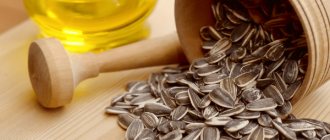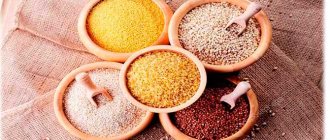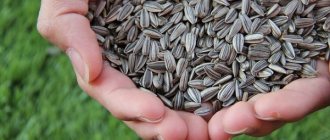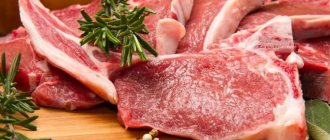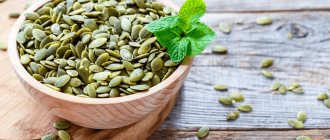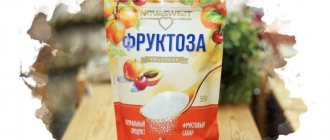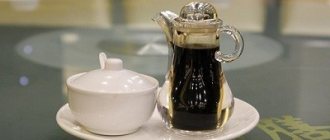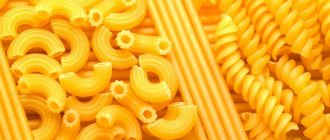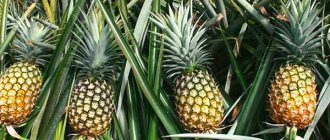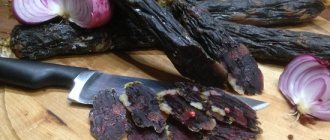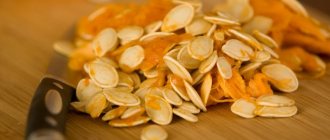Sunflower seeds
Good afternoon, dear readers! Sunflower seeds are simply a tasty and popular delicacy for many. Who doesn't like to crack sunflower seeds while sitting in front of the TV?
For some time it was believed that such a craving for this product could provoke an attack of appendicitis, but this myth has now been dispelled.
Traditional medicine and even modern science have recognized the fact that sunflower seeds are useful to take for disorders of the endocrine and nervous system.
What else are sunflower seeds good for our body? Let's take a closer look!
Sunflower seeds: chemical composition
Seeds are simply vitamins, amino acids, and vegetable fats. In addition, the kernels contain fiber, which is necessary for normal digestion. This product is especially valued (especially by raw foodists and vegetarians) for its high content of Omega-6 and -9.
Vitamins can be distinguished - Vitamin A, B vitamins, Vitamins C, E, Vitamins D, K, PP. Of the macro- and microelements, the most abundant are potassium, magnesium, calcium, iron, sodium, manganese, phosphorus, selenium and zinc.
BZHU for 100 gr. – proteins (20.7 g.), fats (52 g.), carbohydrates (15.5 g.)
Chemical composition
The benefits of sunflower seeds
Despite the fact that the sunflower is considered a plant that symbolizes Russia, it was brought to our country from America not so long ago - in the 18th century. Moreover, in those days it was used only as an ornamental plant. But now we can’t imagine how we can live without this plant food product from which sunflower oil is made, so rich in saturated and unsaturated fatty acids, vitamin E, as well as D, A, group B. Of course, these substances are also present in other products , therefore, along with sunflower oil, it is useful to eat them regularly.
It is noteworthy that for the first time, a Russian peasant obtained oil from sunflower seeds, having guessed to squeeze it cold, using a wooden mallet. This happened in 1826, and since then sunflower oil has been one of the most common vegetable oils throughout the world.
Sunflower is rich in micro and macroelements: calcium, iron, potassium, magnesium, selenium, iodine. They contain proteins, carbohydrates and fats, starch and sugar. Vitamin E in their composition affects the beauty of our hair, skin and nails, it is able to preserve our youth, improves metabolic processes in the body.
Vitamins that belong to group B strengthen our nervous system, eliminate depression, and have a beneficial effect on the gastrointestinal tract.
The process of licking itself is also beneficial for our nerves, replacing sedatives.
Vitamin A, as we all know, strengthens vision and also promotes healthy skin and hair. There is even more vitamin D in the seeds than in cod liver, which only speaks of the benefits of consuming them.
Potassium is important for the heart and blood vessels, and fatty acids are of great importance for maintaining normal fat metabolism, preventing the development of cancer, atherosclerosis, and cardiovascular diseases.
If we consider sunflower seeds: the benefits and harms of consuming them, then after weighing all the pros and cons, you can draw your own conclusions.
Sunflower seeds: benefits
Only with moderate use:
1. Strengthen the walls of blood vessels, normalize blood pressure, reduce “bad” cholesterol, and improve heart function.
2. Improves intestinal function and eliminates constipation.
3. Nucleoli are a good prevention against joint diseases and oncology.
4. Improves the condition of teeth, visual acuity, strengthens bones.
5. It is recommended to use to normalize a person’s emotional state, nervous disorders, help fight depression, and relieve stress.
6. Will help improve the functioning of the respiratory system in asthma.
On a note! It is most beneficial to consume raw seeds or slightly dried ones. Although fried ones have a more pleasant taste, their benefits are minimal. After roasting, up to 80% of all beneficial substances evaporate!
Phosphorus and selenium are good in moderation
The microelements that sunflower seeds are rich in provide benefits to the body only in normal dosages. Exceeding it regularly results in unpleasant consequences. 150 grams of the product contains 232 percent phosphorus and 200 percent selenium of the recommended daily intake.
In this amount, phosphorus provokes a violation of calcium metabolism. It is not absorbed by bone tissue, but settles in the vessels, causing their calcification. The consequences of this process are fragility of blood vessels and bones, impaired renal function. Selenium is just as dangerous in large dosages. It provokes disturbances in the functioning of the nervous system, splitting of nails, and hair loss.
Sunflower seeds accumulate heavy metals (Photo: Pixabay.com)
What are the benefits of sunflower seeds for women?
1. Thanks to the high zinc content, they will help restore shine to hair, eliminate dandruff and flaking of the skin.
2. Vitamins A and E play an important role in the body's metabolic processes and slow down the aging process. Only 30 gr. There are enough nucleoli to cover the daily requirement of Vitamin E.
3. Based on the nucleoli, you can prepare scrubs that will restore the structure of the skin, renew cells, and remove the stratum corneum.
4. Vitamin B6 and folic acid also improve the condition of the skin, nails, and hair. Help relieve unpleasant symptoms during menopause.
5. They help cleanse the intestines, improve digestion, and therefore promote weight loss and weight normalization.
During pregnancy and breastfeeding
Composition, calorie content and nutritional value of seeds
Small seeds are a rich source of valuable substances and vitamins. They contain:
- vitamins E, A and D;
- amino acids and vegetable fats;
- cellulose;
- subgroup B vitamins - from B1 to B12;
- ascorbic acid;
- vitamins K and PP;
- potassium and phosphorus;
- sodium and calcium;
- magnesium, manganese and zinc;
- iron and selenium;
- Omega-9 and Omega-6.
The nutrients in the product are distributed as follows: fats account for 52 g, proteins are present in a volume of about 20 g, and carbohydrates contain only 15 g. The calorie content of the product is quite high - there are 570 calories in 100 g.
Sunflower seeds during pregnancy and breastfeeding
1. It is recommended to consume raw seeds during pregnancy. They have fewer calories and rarely cause heartburn or diarrhea.
2. It is better to buy already peeled or clean with your hands, so as not to chew the husks or spoil the tooth enamel, which during this period becomes very fragile.
3. They will enrich the body with vitamins and beneficial elements, especially in the first and second trimester of pregnancy.
4. Folic acid is especially necessary for the proper development of the fetus.
5. Dosed consumption will help control weight and normalize cholesterol.
6. One small seed of seeds will put the nervous system in order, relieve irritability and excess excitability, and can also be used to relieve toxicosis and vomiting.
7. During breastfeeding, be very careful and attentive. Seeds are classified as allergenic foods, so try introducing them into your diet in minimal doses two months after giving birth and monitor your baby’s reaction. If everything goes well, this product will enrich mother’s milk and make it more nutritious.
8. Use no more than 20 grams. raw seeds per day, otherwise the child may experience diathesis, colic or bloating. Fried kernels add a slight bitterness to the milk and the child can simply refuse such milk.
The use of sunflower seeds in cosmetology
The presence of vitamins A, E and D in the product, as well as the high fat content, are the reasons why the properties of the seeds are valued in cosmetology. Crushed seeds are often used in homemade face masks; scrubs based on seeds have a particularly beneficial effect. Sunflower seeds help get rid of acne and improve the structure of the skin, making it more elastic and toned.
The product has regenerating properties and promotes the healing of skin damage. Therefore, homemade ointments are made from the seeds, which have a beneficial effect on cuts, scratches and burns. And sunflower seed oil has a beneficial effect on the skin and strengthens the hair structure when used in medicinal masks.
For the treatment of hypertension
You need to prepare a decoction of two glasses of raw seeds and a liter of water. Boil the product for two hours after boiling. Then cool, strain, take 0.5 cups twice a day for 14 days. After a week, if necessary, the course can be repeated. To boost immunity
If you have a weakened immune system or during cold and flu season, you can prepare a medicinal mixture from their raw, peeled seeds, fresh honey, and adding a few drops of lemon juice. Take a teaspoon every morning.
Treatment of prostatitis with folk remedies
If you don’t have a summer cottage where you can grow a huge pumpkin on your own, buy seeds at the market. But then they must be disinfected. Pour into a large container, fill with cold water and throw in 2-3 grains of manganese. Leave for 30 minutes until the peel softens. After this, drain the water and place the seeds on a towel until completely dry.
After that, we peel the seeds from the husks with our hands, and use the seeds for treatment:
- Three times a day, half an hour before meals, we eat 30 seeds for a month, then take a break for a week and repeat the course of treatment again.
- Grind the kernels into powder, put it in a cool place and eat 1 tbsp twice a day. spoon, washed down with cold water and honey.
- Grind 500 g of seeds and mix with 250 g of honey, leave for a week to thicken, then make balls from the mixture and dissolve these delicious tablets twice a day in the morning and evening before bed.
How to fry raw sunflower seeds
It is not at all necessary to buy ready-made, roasted seeds in the store; you can roast them yourself very simply and quickly.
Pour unpeeled raw sunflower fruits into a hot frying pan, fry over low heat, stirring all the time for 10-15 minutes. When the kernels are fried (just try one), pour into a plate, cover with a towel, and let cool completely.
You can simply dry it in the oven with the door open for 5-10 minutes.
With any method of preparation, the seeds must be thoroughly washed first.
You can fry the seeds with sea salt. To do this, they need to be soaked in water, where a little salt was previously diluted, for 20-30 minutes. Then pour directly into the frying pan with water and fry until all the water has evaporated.
On a note! You can fry the peeled kernels immediately, but no more than 5 minutes over low heat until golden brown.
Sunflower seeds
Rules for using sunflower seeds
When consuming a healthy product, it is important to identify high-quality grains and calculate the daily intake for a person in accordance with age, health, and body weight. You need to choose a cooking method to preserve vitamins and microelements
To maintain product quality, storage temperature requirements are taken into account.
There are no age restrictions for seeds. However, for joint diseases in older people, the volume of the product is limited to prevent inflammation.
Choice
Experts recommend following the following rules when choosing sunflower grains:
Seeds are purchased with the peel; the kernels, peeled and packaged, do not retain their nutritional value, vitamins, or microelements.
In open air, the product oxidizes and loses its beneficial characteristics. It is important to purchase freshly harvested seeds; you can determine the characteristics by the date on the product packaging. Sunflower seeds are usually collected in early autumn (September-October)
Valuable substances and vitamins are preserved in the kernels packed in the autumn. Products packaged in spring are less valuable; during storage, the oil components in the grains deteriorate and may become bitter; in damp rooms, the grains become covered with mold. To add to salads and baked goods, you need to buy seeds that are not roasted or salted. Heat treatment changes the taste and quality of the product. Adding salt to the kernels does not reduce the amount of vitamins, however, when consuming large quantities of salted grains, swelling of the skin may occur and body weight may increase. Natural products are sold in markets, in departments with fresh vegetables and nuts. Packaged products undergo heat treatment, add salt and are treated with flavor stabilizers and substances to extend shelf life.
Norms and preparation
The high fat content and calorie content of grains must be taken into account when planning your daily diet. The safe standard for seed consumption is 15-30 g. Nutritionists prohibit excessive consumption of the product to prevent weight gain.
The rules for preparing sunflower grains provide the following recommendations:
- It is necessary to thoroughly wash the seeds in their shells to remove dust and dirt collected during transportation. The water should be running; a colander or fine sieve is used for processing.
- Cooking is carried out in a dry frying pan or baking sheet; it is not recommended to use vegetable oil and salt.
- To maximize the preservation of nutrients and vitamins, you need to dry the grains in the microwave or oven.
- It is not recommended to overcook the product during frying.
Storage
Sunflower grains are not resistant to external influences. The optimal temperature regime for preserving vitamins and minerals is 0…+10°C. At high temperatures, the product deteriorates within 24 hours. The optimal place to store sunflowers is the refrigerator. Oxidation in a cool place will be stopped, vitamins and protein components in the grains will be preserved.
After purchasing the grain, it must be dried. The permissible shelf life after heat treatment (drying, frying) is 1-2 weeks.
How to crack seeds correctly?
Experts do not recommend cracking seeds with your teeth, because tooth enamel is not restored. The peel is removed by hand, the grains are placed between the index and thumb. If cleaning the seeds is difficult, you can dry them a little in the oven. After heat treatment, the peel is quickly removed.
It is convenient to purchase freshly peeled kernels and process them at high temperature. Roasted seeds are recommended to be used within 2-3 days to prevent product oxidation.
Sunflower seeds: how to choose, how to store
When buying in a store, it is difficult to determine the quality of seeds, since the packages are always dense and opaque. You can only look at the date of packaging. The harvest is harvested in the fall, which means the date should be somewhere in these autumn months.
If the seeds are sold by weight, then you should pay attention to:
1. Smell without rotten or bitter aroma.
2. Black peel without damage, gray coating, shines a little.
3. It is better to take from medium-sized seeds, they are the most delicious and easier to clean.
4. If the seller allows you to try, then this is the best way to check the quality of the product.
Raw kernels spoil very quickly, so it is better to spread them in an even layer in the sun and dry them a little.
It is better to store in the refrigerator, put the seeds in paper bags. Can be stored for up to 9 months.
Roasted seeds can be stored for no more than a month or a maximum of one and a half.
Tooth enamel is not restored
The habit of chewing seeds with your teeth leads to the destruction of tooth enamel. Microcracks appear on it, which increase over time. Enamel does not protect dentin from contact with the external environment, tooth sensitivity develops, and eventually caries. The front teeth of those who like to husk seeds are characteristically chipped at the edges.
For the product to be beneficial, consume no more than 30 grams of sunflower seeds daily. If you like to enjoy them longer, chew no more than 100 grams two to three times a week.
Sunflower seeds: harm and contraindications
1. Do not consume seeds with husks. The husk is not digested in the body and can cause constipation or problems with the intestines or stomach.
2. Do not consume roasted seeds if you have chronic liver diseases, stomach ulcers, acute gastritis, pancreatitis, only raw or slightly dried and in very limited quantities.
3. Do not use at night, otherwise all the calories will be deposited in problem areas.
4. Do not use if you have gallbladder diseases, acute gout, intestinal colitis, or a tendency to obesity.
5. If you have an individual intolerance or allergy to this product.
6. The habit of regularly shelling seeds can lead to the destruction of tooth enamel, the development of caries, and the formation of tartar.
7. Vocalists are prohibited from using this product, as the seeds have an enveloping effect on the vocal cords.
Benefits and harms: product composition, effect on the body during nutritional reduction
Sunflower and pumpkin seeds are allowed to be included in the diet when losing weight in small quantities. The limitation is due to the fact that 100 g of the product contains about 512 kcal. However, during a reduction in nutrition, this product will allow the body to replenish its supply of essential vitamins and minerals. It is enough to eat about a handful of seeds per day.
Another advantage of the product when dieting is the quick satisfaction of hunger and a long-lasting feeling of fullness. Other beneficial properties of seeds for humans should be noted:
- lowering cholesterol levels in the blood, which prevents the formation of cholesterol plaques on the walls of arterial vessels, thereby preventing atherosclerotic disease;
- acceleration of metabolism;
- stimulation of intestinal motility;
- converting fat deposits into energy.
Important! To lose weight, you can unload on pumpkin seeds once a month. They contain hard-to-digest dietary fiber, which stimulates rhythmic contractions of the intestinal walls (peristalsis), thereby normalizing digestion processes.
The food in question also has a number of disadvantages, which are especially pronounced with regular consumption of seeds:
- destruction or thinning of tooth enamel;
- formation of stones on teeth;
- impaired functioning of the kidneys and liver. This is largely due to the significant protein and fat content of sunflower seeds.
Attention! Sunflower seeds should not be consumed by those who have problems with the functioning of the kidneys and liver - the body's natural detoxification organs. Since many of the fields where sunflowers are grown are located near highways, the plant absorbs toxic substances found in exhaust gases from the soil. Among these substances: mercury, lead, cobalt, heavy metals. All of them enter the human body with sunflower seeds. And with reduced kidney and liver function, toxic substances accumulate in the body and cause poisoning (intoxication).
If consumed excessively, the product has a negative effect on the figure.
Nutritionists recommend using sunflower, pumpkin or flax seeds during the diet. The beneficial properties and energy value of the first two products will be discussed below.
The form in which food is consumed is also important. Raw and roasted kernels have different effects on your figure. Those losing weight also need to know about the optimal time to take seeds, due to which fat reserves are not deposited.
Pumpkin or sunflower
When losing weight, people resort to consuming sunflower or pumpkin seeds. Nutritionists argue about the usefulness of the first product for the body losing weight.
This is due to the fact that it can negatively affect the condition of the pancreas and, thereby, complicate the loss of extra pounds. Or even cause inflammation of the organ, both acute (acute pancreatitis) and chronic (chronic pancreatitis).
Sunflower seeds contain many useful components - from amino acids to magnesium, which are necessary for the proper functioning of the heart and nervous system. Thanks to the large amount of fiber, sunflower kernels give you a feeling of fullness for a long time and fill your stomach. Moreover, such satiety is caused not only due to irritation of baroreceptors (receptors responsible for the feeling of stretching of the walls of organs), but also due to the intake of necessary calories into the body.
Doctors do not recommend completely giving up sunflower seeds when losing weight, since the fatty acids they contain have a positive effect on the condition of the skin, hair and nail plates.
Advice! You can quickly get rid of sunflower seed husks using a blender. The product is cranked at low speed for several seconds. After this, the mixture must be filled with water and left for a while. The kernels will remain at the bottom, and the husk will float.
Pumpkin seeds are considered even more high-calorie - 100 g of product contains about 600 kcal. For this reason, nutritionists recommend limiting their consumption to 20 g per day.
You shouldn’t completely remove them from your diet either, since the seeds have several beneficial properties for the body:
- Normalizes intestinal motility. Due to the significant content of hard-to-digest dietary fiber, intestinal motility increases, which is why digestion processes improve and food masses pass through the intestines faster.
- Stimulates metabolism. The vitamins contained in the seeds accelerate the absorption of nutrients from food and accelerate the breakdown of food components during digestion reactions by accelerating their activation.
- Normalize hormonal levels. Pumpkin seeds contain components that stimulate the production of thyroid hormones. These hormones regulate metabolic processes; at low concentrations, metabolism slows down, which leads to an increase in fat deposits.
Pumpkin seeds can be used as a mono-diet. In this case, eat 200 g of product per day throughout the day. You can continue unloading for no more than 2 days, since pumpkin kernels will not be able to provide the body with all the necessary microelements. During the seed diet, you are allowed to drink only water. At the same time, the average person should drink at least 1.5 liters of still water per day.
Raw or fried
During the diet, preference should be given to raw kernels. Fried foods are prohibited when losing weight, regardless of the variety.
Important! When roasting, the calorie content of sunflower and pumpkin seeds increases from 520 and 600 kcal to 800 and 900 kcal, respectively. Heat-treated seeds can be substituted for several meals or a complete diet with proper nutrition.
As a sweet treat, you can allow yourself a little halva on a diet. However, it is necessary to take into account the high calorie content of halva, so it is worth keeping a calorie counting diary, in which you need to note all meals, its volume and calorie content.
Day or night
The product should be consumed in the first half of the day to maintain normal weight. Consumption of seeds at night when losing weight is unacceptable, as this negatively affects the digestive system.
Even a small amount of sunflower and pumpkin kernels eaten at night can cause insomnia, bloating, heartburn, and colic. The only type of seeds that nutritionists allow to be consumed before bed are sesame seeds. They can be eaten separately or together with low-fat fermented milk products.
You may also be interested in: Lowest calorie dried fruits for weight loss
